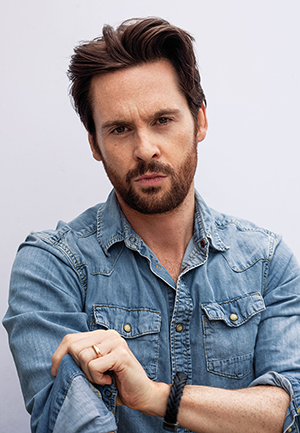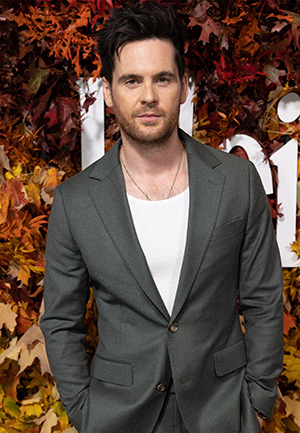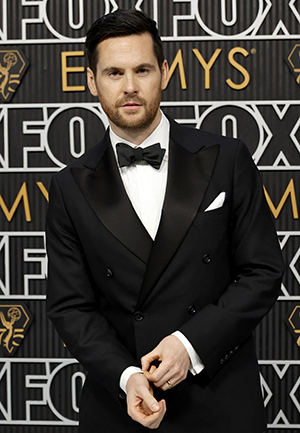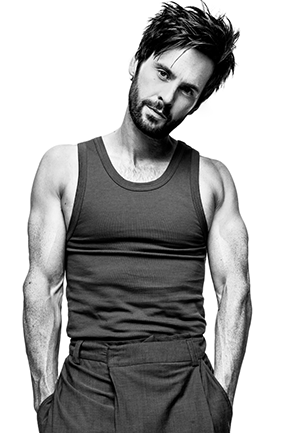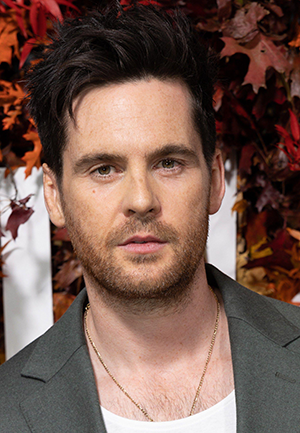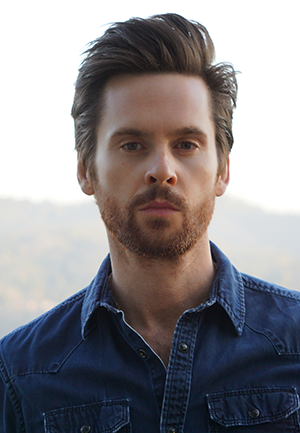A new interview with Tom Riley has been shared by Collider.com. In it, Tom discusses Dark Heart (he would love to do more episodes), directing The Toll Road, writing, and a bit about Da Vinci's Demons. Apparently Tom has also added to his producer credits with Dark Heart! The article states that the interview was conducted by phone, so explains the weird mixed metaphors, and some oddly difficult to decipher sentences. I assume Tom said 'pull the rug out from under people’s feet' not wool, and also 'autistic art student' rather than artistic. Read it in full on Collider.
Collider: I’ve read that the two-part pilot had originally aired a couple of years ago, and now we’re getting a six-episode series. When you shot that original pilot, was it more of a one-off movie, or did you always know that you’d be doing more episodes?
TOM RILEY: Yeah, it’s a bit of a weird one. There was a channel here (in the UK) called ITV Encore, which was an off-shoot of the main ITV Channel. They wanted to make darker, more boundary-pushing dramas, and they came to me with this, which was initially an hour and a half one-off that was like a feature film. There were always people whispering that, should it do well, or should Chris [Lang], the writer, feel like there was more gas in the tank, that it might turn into something else, but we certainly weren’t obligated to. There was no option on it, or anything like that. It was just that, if we felt we could move somewhere with it, then we would. But then, the channel became de-funked and it was freed up, and it became the choice of the creatives in charge, all getting back together. And then, we split that in two and made it the first two episodes of the series.
When the series did come back and you were able to revisit this character again, did it feel like there was still a lot more there to explore with him?
RILEY: Yeah. For me, when I came back on board, there were long chats about, what do we do with this guy? There was a certain feel for the one-off thing that felt like stuff that we’d seen before from cop shows, where the guy has a past with trauma and he doesn’t play by the rules, and all of that stuff. So, it was important to me, and to Chris [Lang], to unpick all of those tropes and pull the wool out from under people’s feet, as the story progressed. As we found out more about his past, all of those tropes became the things that hampered him rather than being the things that where his cop superpowers, like there are in a lot of other dramas. We just wanted to explore his past a bit more and got to make that happen.
Dark Heart reunited you with one of your Da Vinci’s Demons directors. What was it like to work with Colin Teague again, and how does this experience compare to working with him on that?
RILEY: Not just with Colin, Gregg Chillin pops up again, from Episode 3 onward. Colin is great. We have a very easy shorthand with one another because of Da Vinci’s. He actually proceeded over an episode of Da Vinci’s, in the third season, where I was hanging upside down, half-naked and freezing cold, with all of the blood rushing to my head, for a 12-hour day, so he’d seen me in the worst possible circumstances. It was great to have that because he gets how I work, and I got how he works. He did all six [episodes], which is rare.
What was it about this character, DI Will Wagstaffe, that most appealed to you?
RILEY: Part of what drew me to it was Chris Lang, who did a show [in the UK] called Unforgotten, which is a very sharply scripted character procedural, but it has a more naturalistic approach. For this, Chris very much wanted to heighten it and to a goth version of Unforgotten. Chris very much leaned into that idea and, in doing so, wanted to explore the shades of grey, in justice and police cases, generally, and the issues of morality, on both sides of the coin. That’s very much what Wagstaffe is about. You see a guy who’s very un-evolved, as a man. He’s in a state o arrested development, from when his parents were killed when he was 16. He’s aware enough to know that he’s not very involved, but he’s not evolved enough to deal with it, which is the paradox of the century. He has outbursts that he apologizes for. He has moments of pushing the boundaries, and then saying, “No, we have to live in the parameters of the law.” He is constantly taking revenge his sister’s boyfriend and her personal life, but then the same time, as a police officer, he’s telling people to uphold the rule of law. The interesting thing about that is how, over the course of the series, you’re gonna see how that’s unsustainable and he’s gonna have to pick one way or the other, because otherwise it’s gonna bring a lot of pain for people in his life and make him not the best at solving cases. Apart from the pilot, the way these cases are solved is messy. It’s like real life. They don’t quite tie up, in the way you might hope for. They’re a bit more like real life. It doesn’t necessarily lead to the neatest tied bow. We get to learn more about this guy through his relationships with the women in his life, whether it’s his interactions with his sister (Charlotte Riley), his work partner (Anjli Mohindra), or his on-and-off girlfriend (Miranda Raison).
What did you most enjoy about exploring those dynamics and seeing how each of those women interacted with him?
RILEY: When I was coming back into it, I knew that was something that we really needed to not drop the ball on. I was adamant that these women are smarter than him and better people than him. His girlfriend, as the series progresses, is going to come to that realization herself. In the case of Chancellor, he wildly underestimates her. Particularly in the final episodes, he gets to a point where he’s making decisions, deciding on the case, and not listening to her, when he probably should be. That was the stuff that I thought was the stuff we shouldn’t let go of. For me, just working the Charlotte Riley, who I love and who I’m not related to, was just the best. That’s where you really get to see who he is. It doesn’t matter how powerful you are in your job. When you go home to your family, particularly your siblings, they are so unimpressed. I’m speaking from personal experience. They are so unimpressed by what you do for a living ‘cause you’re still that annoying teenage brother. So, you really get to see who he is and who he trying to be, when he’s with her.
Are you hoping to do more episodes or mini-movies for Dark Heart?
RILEY: Certainly, the way the show ends, I think you’re gonna want to see more. I would like to continue his story. The straight jacket to doing procedurals is that the driving force of the arc of the character becomes a little scattered, throughout the episode, because the main drive of the episode is the case of the hour. I would love to continue it, to see more about him, for as long as that needs.
With Da Vinci’s Demons, The Collection and Dark Heart, you’ve played three very different characters. When you sign on to do a project, especially a TV project, is playing a character that is so very different from the last one something of a requirement for you?
RILEY: It really is, and it’s become increasingly difficult, particularly after Da Vinci’s. You get moved, in the heads of casting directors, into a place where you are in the leading male roles. That was not how I started my career, at all. My first jobs were as a working class northern guy with a chip on his shoulder, and an artistic art student. It was all like completely different stuff. The problem is that those kind of roles are very difficult to find in a lead. The peripheral characters tend to be the most interesting character parts. Trying to find those roles that would count as number one or two on the call sheet, which I’m not married to, by the way, is hard to find. So, I have actively been trying to find people who are different.
You’ve also tried your hand at directing, doing a short film called The Toll Road, which was written by a friend of yours (Richard Galazka) and your wife (Lizzy Caplan) is in it. How did that come about?
RILEY: My friend was an actor for many years, and he sent me a script a few years ago and said, “Just give this a read.” It was a feature, and I thought it was just one of the best scripts I had ever read. It came out of nowhere from him. He’s been keeping that under his hat. So, I just called him and said, “This is unbelievable!” He said, “I don’t think I’m gonna do anything with it.” And then, about seven months later, I got an email and his headshot was at the top of it. He’d been picked for the Best Unproduced Screenplay in Britain. He then got into that and, as a pallette cleanser between drafts, he wrote this short and sent it to me. I was like, “You know what? We should just try to do this.” That was during Da Vinci’s Demons, and I just couldn’t find the time. It just was impossible to do it, but I wanted to do it so much. I wanted to have control. I had been lucky enough to be a producer on Da Vinci’s Demons, and again on Dark Heart, and I got to peak behind the curtain a bit, so I just wanted to take some control, from beginning to end. And then, we met with a production company in L.A. and they were like, “We’ll fund this. When can you do it?” I said, “I can’t!” And then, I found a week, in between a play I did this year and the beginning of Dark Heart, and I flew out and did it. I said, “If I don’t do this now, I fear I will never do it.” And I loved it!
When you finished the short, did you immediately start looking for a full-length feature to do?
RILEY: I’m actually writing something right now. I started it a few weeks ago, and I’m working on it when I’m actually able to write and don’t procrastinate. I’m trying to take advantage of it before I run out of juice. It’s definitely something I want to do, on a larger scale.
How is writing something for yourself going?
RILEY: I wouldn’t be in it. I’m writing it for someone either than myself. It’s the same with directing. A lot of actors who write and direct are desperately seeking for vehicles for themselves that they cannot find elsewhere. But really, I just enjoy being on the side of the camera where no one is fiddling with me, checking my mic, playing with my hair, or dabbing my nose with a sponge. It feels like a break. I want to have it be a separate part of my career. TV has changed so much in the last 10 years, and it’s even changed quite a bit in the last five years. What are the biggest changes you’ve noticed in TV, just since doing Da Vinci’s Demons? RILEY: In the last five years, there’s stuff that is definitely worth celebrating, and there’s stuff that makes it increasingly difficult. The stuff worth celebrating is definitely the increased diversity on screen, which is brought out, fortunately, by a fiscal response. That’s the only way the industry seems to sit up and listen. They’ll go, “Okay, there’s money in this, so we can actually do.” So, that’s great. The way that it’s harder for someone on my level is the fact that Julia Roberts wants to do TV, or you read a cast list for a new Apple show and the first 10 people have won Oscars. It’s wonderful that there’s more content and it’s providing opportunities, but at the same time, it’s squeezing those opportunities. What that means is that there’s a lot of fantastic content, and as something like The Haunting of Hill House proves, you don’t need to fill something with names to make something fantastic.
Dark Heart is available to stream at BritBox.

